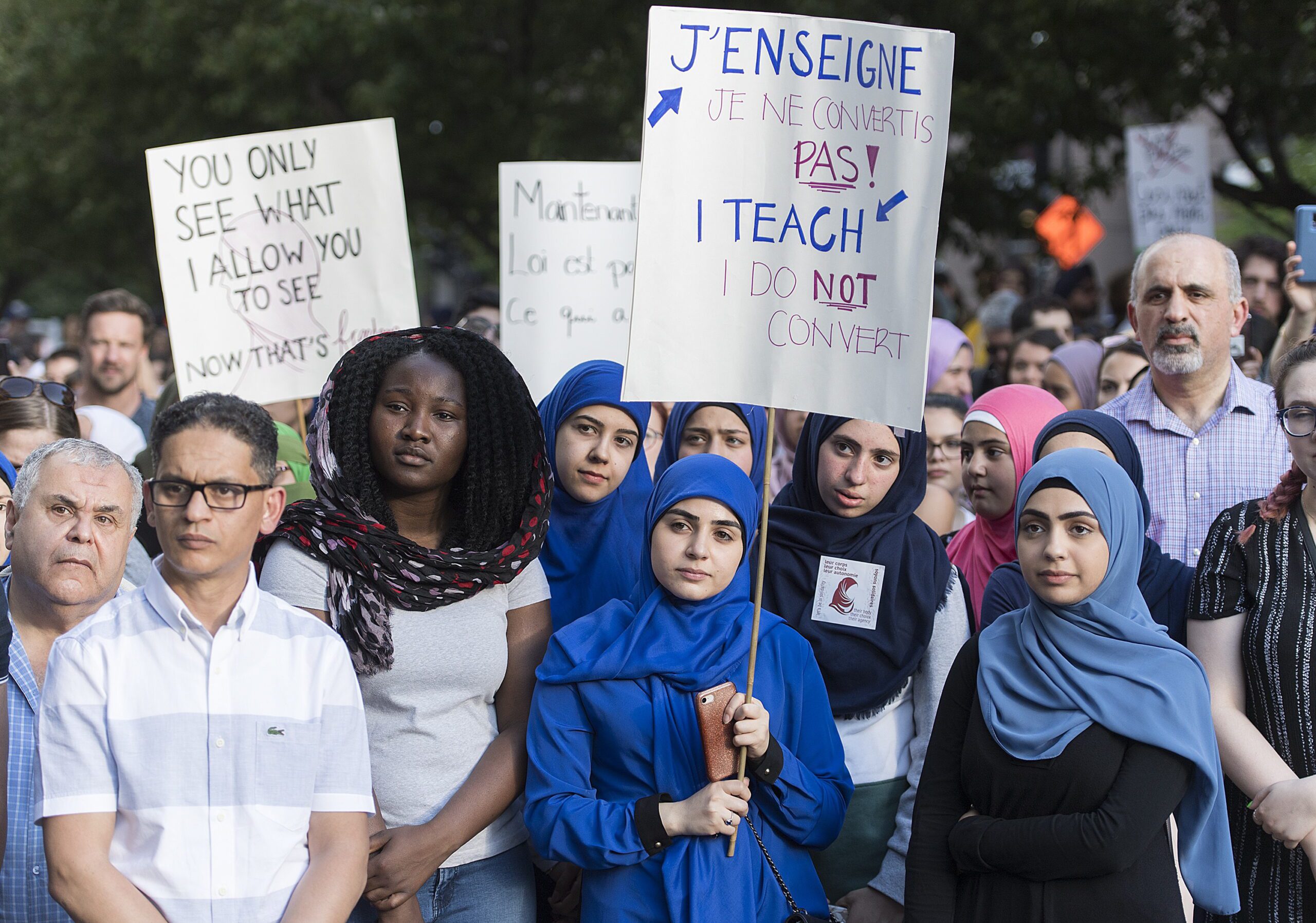In April, my husband and I decided to introduce our 11-year-old daughter to our love of Quebec and booked a family summer holiday in the province. When Bill 21 — the “secularism law” preventing many new provincially-paid employees from wearing religious symbols or clothing — came into effect, I began to question our choice of destination. We still felt remorse for travelling to Las Vegas to renew our marriage vows in July 2018. While we were there, the American administration made news for caging large numbers of people who were seeking refuge from the horrors of their homelands. The shame, guilt and disgust we felt at being tourists in a country that would do such a thing made us vow never to return until the country’s leadership started to care more about social justice. Yet here we were, with plans to holiday in a province that we also thought was behaving in an oppressive and bigoted way. It felt hypocritical, so we cancelled our one-week trip to Quebec.
I respect all religions and consider it a fundamental Canadian right to worship as one chooses. While nobody should be allowed to force their religious beliefs on others, crosses, hijabs, turbans and yarmulkes are not uniforms of recruitment by those who don them. Nor does seeing a police officer, teacher or public legal defender wearing a religious symbol make me think Quebec is endorsing that particular religion. Canadians have diverse beliefs; it’s part of what makes us unique and well-respected in the world. What’s next in what feels to me like a ridiculous attempt at impartiality? Banning T-shirts supporting veganism or concern for the environment? Outlawing hats that indicate favourite sports teams?
You may unsubscribe from any of our newsletters at any time.
Bill 21 feels less like secularism to me and more like pronounced partiality to religions that don’t include wearing overt items of faith. While Catholics are affected by this law, one can still wear a cross without detection. It would appear that religious symbols brought to Canada via our beneficial immigration policies are really the targets here. Yet many Canadians don’t seem motivated to do anything about what’s going on in Quebec.
I spoke with Amrit Kaur, a 28-year old Sikh teacher who chose to wear her turban as a sign of her religious faith. Kaur is the Quebec and Atlantic Canada region vice-president for the World Sikh Organization of Canada and has been understandably vocal against Bill 21. Kaur has to leave her home in Quebec this month and move to British Columbia to start her first teaching job (she graduated from teacher’s college the same day Bill 21 was passed) to avoid the risk of being disciplined for wearing her turban at work.
More on Broadview: Canadian laws still put sex workers in danger
“Any form of peaceful protest action that is heard is good action,” Kaur said. “People outside Quebec who disagree with this law need to talk to their MPs. They need to rally their companies, organizations and regulatory groups to issue statements condemning the bill.” Kaur is passionate about the effect of what she calls religious symbol fear-mongering on children in Quebec. She worries the law will lead children to believe that certain professions are only open to those who don’t wear signs of their faith, while also making Quebecers intolerant of diversity. That intolerance could make visiting or living anywhere in Canada a challenge, considering our mix of people from many different backgrounds and religions.
While the few thousand dollars my family planned to spend in Quebec won’t really affect its economy, the province received more than four million tourists from other parts of Canada in 2016, bringing in approximately $1.3 billion in revenue. To me, that seems like a very big bargaining chip if even a portion of non-Quebecers boycotted travel to Quebec. Does the province not invest in or benefit from tourism to religious historical monuments like St. Joseph’s Oratory?
We cancelled our trip in personal protest, and I don’t expect everyone to express their dissent in the same way. But I am dismayed by polls that indicate only 59 per cent of Canadians outside of Quebec disagree with the law. What if other provincial governments think similar laws might be well-received? I worry Canadians have become indifferent to injustice here after three long years of blatant racism, homophobia, Islamophobia, xenophobia and misogyny in the United States. Do we think we don’t have any influence over what happens in another province? Whatever the reasons, we need to stand up for one another. While the separation of church and state is fundamental to democracy, I think Quebec has misinterpreted that division and I’m saddened to see the government fragmenting the tiles of our country’s beautiful cultural mosaic.
For more of Broadview’s award-winning content, subscribe to the magazine today.















I made a decision not to visit the United States, the day Trump took office and the LBGTQ health page was struck from the White House Newsletter at noon and ever since. I have a gay son, an adult now, who would have been betrayed for sure, whether he knew I visited or not. In my heart I had to stay true to my values and that meant in my actions, too. Our family, our Roxboro United Church in Quebec, our friends and neighbours are affirming and inclusive. Our connection to the Muslim community is strong in our church. Our whole community is diverse by practice. Until diversity is respected in my province, my husband and I march, we rally, we gather at diverse events and we speak out. Maybe Quebec vacations should be boycotted, it would send a clear message that this racism is wrong. Thank you, Jackie Gillard.
As an American-born Québecker, I feel this is false equivalency. I am absolutely opposed to Bill 21, and have protested it myself. But employment discrimination, as bad as it is, is not the same as travel bans, immigration raids, “Go back to where you came from” rhetoric from the leader of the nation faced by minorities in the US.
Tourists to Québec have nothing to fear under Bill 21, but current U.S. policies and behaviours by Customs and Border Patrol and Immigration and Citizenship Enforcement actively are dangerous to the rights and security of non-citizens and minorities the moment they approach the U.S.
We in Québec ought to keep fighting Bill 21. But for Canadians in other provinces to engage in such performative anti-Québec acts only strengthens an unhealthy US/THEM sentiment. And for those of us here, false equivalencies do not help anyone facing discrimination in either the U.S. or here.
It would be false as an equivalency, but not as an analogy. The Quebec bill says clearly that if someone visibly manifests adherence to a religion, that person will in Quebec be treated as a second-class citizen. I too am bewildered that so few people seem to care.
Originally from Ontario, I have lived and worked in Quebec since 1972 and know how threatened the French Canadians feel by their diminishing numbers in this changing world. Law 21 is just another expression of this fear. They do not believe in multiculturalism nor will they ever believe in it. Eventually the “pur laine,” the “souche” will be swamped by others, but in the meantime, until they die out, and until there is a change in the electoral map and that will not happen for some years to come, there will be no change in Quebec with regard to immigration. By the way, other AnglosI know have tried to join the tribe and have become fluent in French but they only get so far until they hit the glass ceiling.
I regret you missed your trip to Quebec.
Consider that many people disagree with that law. Two political parties (Parti Liberal du Québec and Québec solidaire) fought against it shoulders to shoulders with The Human Rights Commission of Québec, the Ligue des droits et libertés and many other organisations. We lost the battle, but we keep struggling and we need solidarity more than condemnation.
I hope you can come and meet some people aware of the consequences of that law in our province.
The province is far to be a monolithical block of francophones. There are many tendencies and a lot of people (intellectuals, trade unionists and all progressive organizations) fighting against racism, discrimination and harassment of all kinds.
It’s difficult to drive from Ontario to New Brunswick without at least purchasing fuel and meals in between. Do we choose between Quebec with Bill 21 or driving through New York, Vermont, New Hampshire, and Maine with Donald Trump? I fear the biggest losers might become the Atlantic provinces.